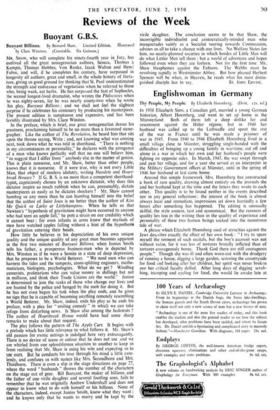Reviews of the Week
Buoyant G.B.S.
Buoyant Billions. By Bernard Shaw. ' Limited Edition. Illustrated by Clare Winsten. (Constable. Six Guineas.)
MR. SHAW, who will complete his ninety-fourth year in July, has outlived all the great nonagenarian authors, Seneca, Thomas a Kempis, Thomas Hobbes, Von Ranke, Izaak Walton and Henri Fabre, and will, if he completes his century, have surpassed in longevity all authors, great and small, in the whole history of litera- ture, giving us good ground for thinking that St. Paul underestimated the strength and endurance of vegetarians when he referred to those who, being weak, eat herbs. He has surpassed the feat of Sophocles, the second longest-lived dramatist, who wrotes the Philoctetes when he was eighty-seven, for he was nearly ninety-two when he wrote this play, Buoyant Billions ; and we shall not feel the slightest surprise if he celebrates his centenary by producing his masterpiece. The present edition is sumptuous and expensive, and has been lavishly illustrated by Mrs. Clare Winsten. In the preface, which is brief, our great nonagenarian denies his greatness, proclaiming himself to be no more than a favoured steno- grapher. Like the author of The Revelation, he heard him that sits upon the throne saying, Write ; and, not knowing what was coming next, took down what he was told in shorthand. " There is nothing in my circumstances or personality," he declares with the arrogance of a man who knows perfectly well that no one will believe him, " to suggest that I differ from " anybody else in the matter of genius. This is plain nonsense, and Mr. Shaw, better than other people, knows that it is nonsense. If it were true, why is not every Little Man, that object of modern idolatry, writing Hamlets and Heart- break Houses? If G. B. S. is no more than a competent shorthand- typist, capriciously chosen by an unknown dictator, why does this dictator inspire so much rubbish when he can, presumably, dictate masterpieces as easily as he dictates shockers ? Mr. Shaw cannot humbug us any more than he can humbug himself into the belief that the author of Saint Joan is no better than the author of Kiss Me Quick or Larks at Littlehampton. When he tells us that Newton's " hypothesis of gravitation might have occurred to anyone who had seen an apple fall," he puts a strain on our credulity which it cannot bear ; for even infants in arms know that myriads of men have watched apples falling without a hint of the hypothesis of gravitation entering their heads. How little he believes in his depreciation of his own unique quality and the unique quality of any great man becomes apparent in the first two minutes of Buoyant Billions, when Junius Smith tells his father, a prosperous business-man who is depicted by Mrs. Winsten as if he were a Semite in a state of deep depression, that he proposes to be a World Betterer. " We need men who can harness the tides and the tempests, atom-splitting engineers, mathe- maticians, biologists, psychologists. What do we get ? Windbag careerists, proletarians who can value money in shillings but not in millions, and think their Trade Unions are the world." Junius is determined to join the ranks of those who change our lives and are hunted by the police and hanged by the mob for doing it. But he has not even begun his task when the play ends, and he gives no sign that he is capable of becoming anything remotely resembling a World Betterer. Mr. Shaw, indeed, ends his play as he ends his preface, with a plea for " smiling comedy " in which we can take refuge from disturbing news. Is Shaw also among the hedonists ? The author of Heartbreak House would have had some sharp remarks to make about that request. The play follows the pattern of The Apple Cart. It begins with a prelude which has little relevance to what follows it. Mr. Shaw's old passion for exotic settings is indulged here very extravagantly. There is no device of scene or colour that he does not use and we are whirled from one splendiferous situation to another to keep us from realising that Mr. Shaw is using his wits and expecting us to use ours. But he conducts his tour through his mind a little care- lessly, and confuses us with names like Mrs. Secondborn and Mrs. Thirdbom. There is even a slip in the stage directions on page 27, where the word " husbands " throws the number of the characters on the stage out of gear. Bill Buoyant, the maker of billions, and the father of one virile daughter and several footling sons, fails to remember that he was originally Andrew Undershaft and does not appear to know what to do with himself or his billions. None of the characters, indeed, except Junius Smith, know what they want ; and he knows only that he wants to marry and be kept by the virile daughter. The conclusion seems to be that Shaw. the incorrigible individualist and aristocratically-minded man who masquerades vainly as a Socialist veering towards Communism, advises us all to take a chance with our lives. No Welfare States for him, no-neatly-planned societies in which hordes of Little Men will do what Littler Men tell them ; but a world of adventure and hopes followed even when they are forlorn. Not for the first time. Mr. Shaw blasphemes against the Fabians. The Webbs must be revolving rapidly in Westminster Abbey. But how pleased Herbert Spencer will be when, in Heaven, he reads what his most distin-


































 Previous page
Previous page